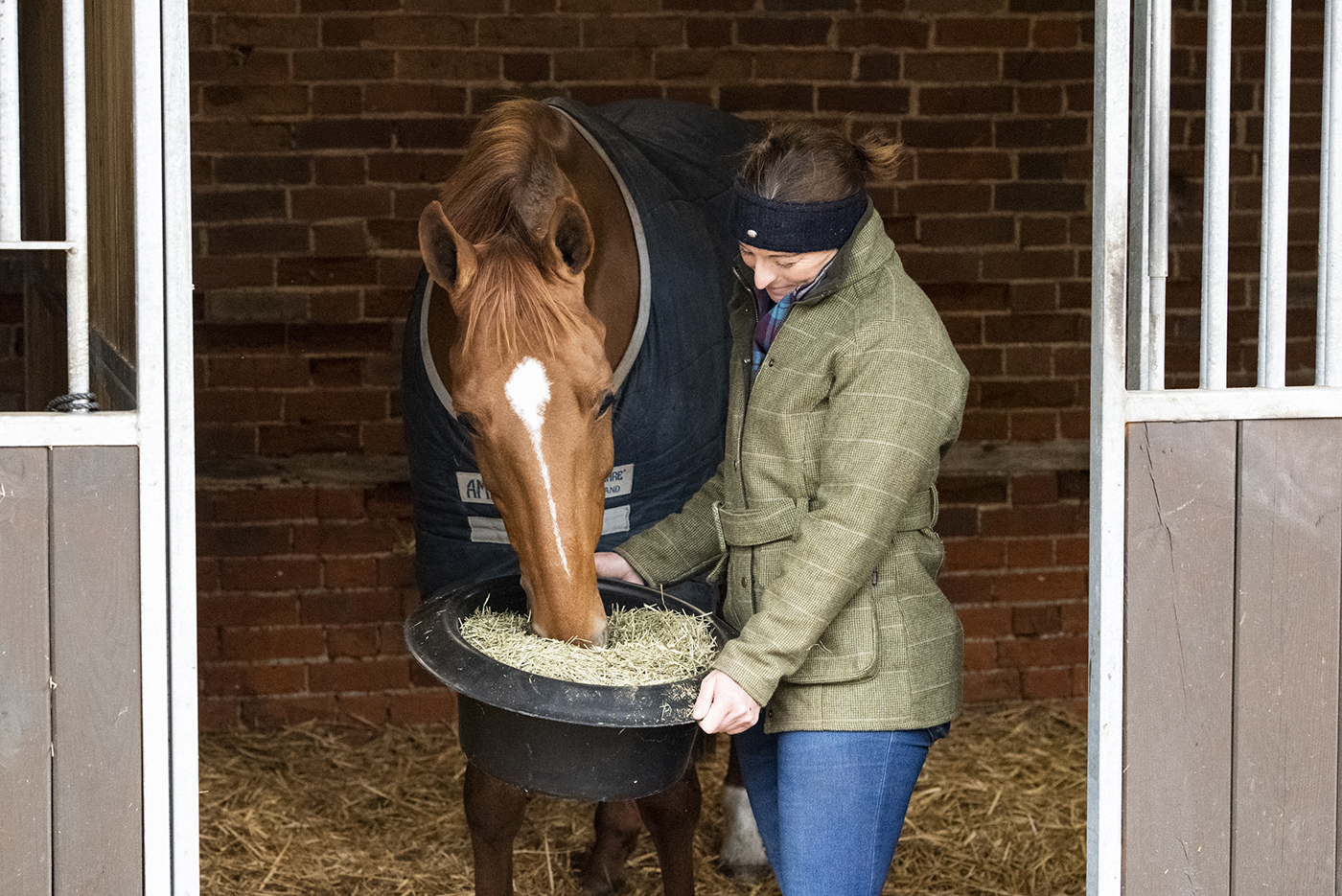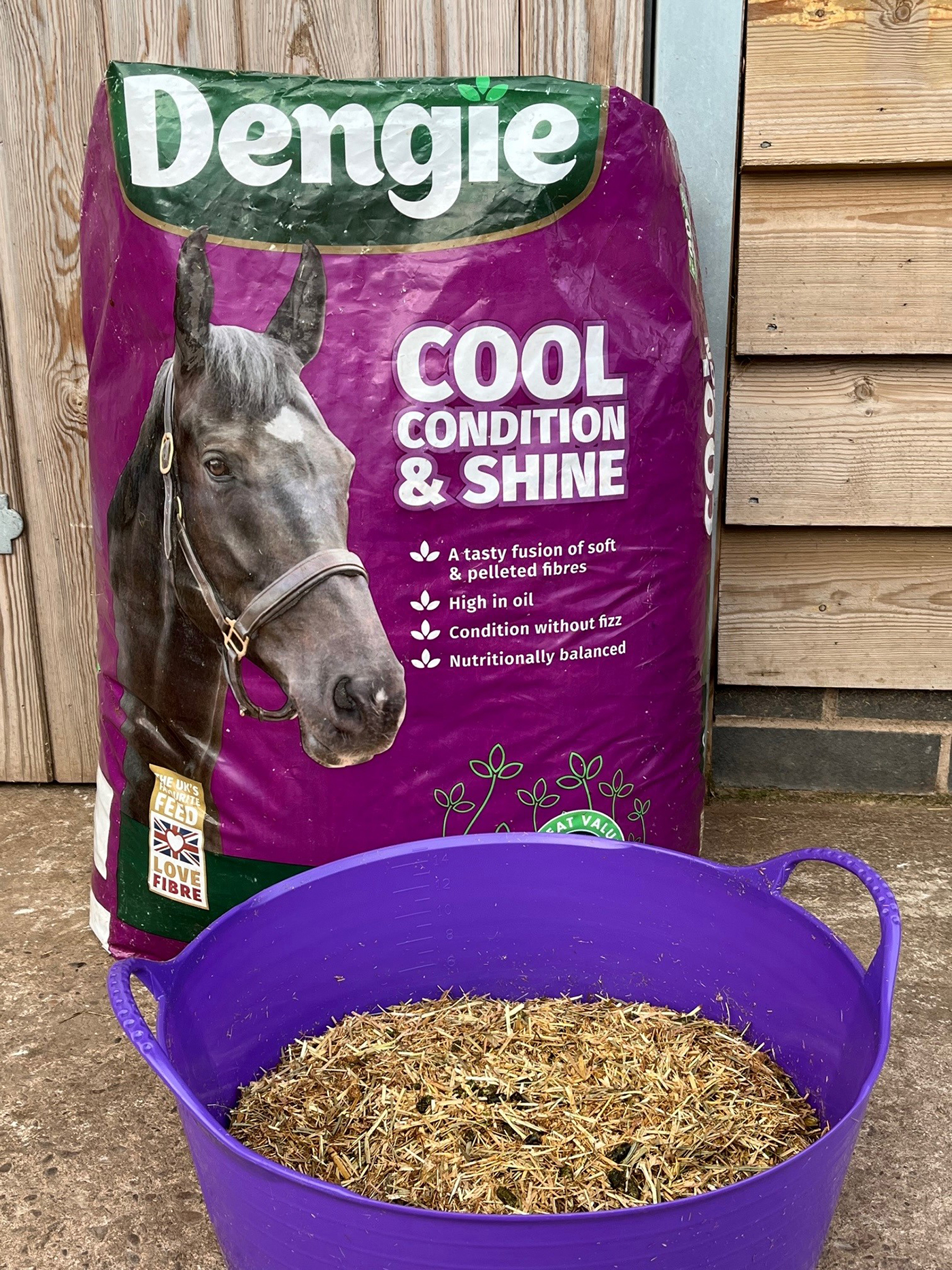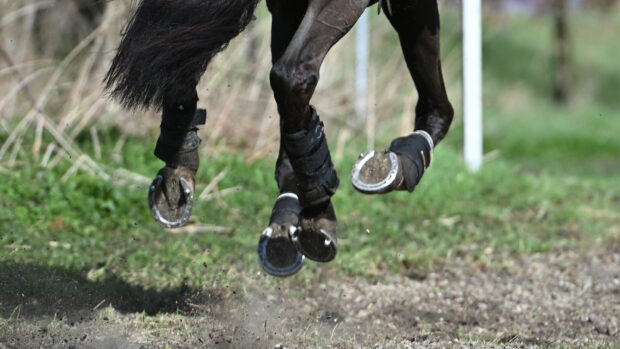Promotional Feature with Dengie
Can you see your horse’s ribs? Are they prone to losing weight over the winter? Is your older horse just not looking quite as good as they were? If any of these apply to your horse, then it’s time to take action. Here are some key areas to consider:
1. Are you feeding enough?
The first step is to make sure you are feeding your horse enough, especially forage such as hay or haylage. This is important not only for weight gain, but also to support a healthy digestive system.
Ad lib feeding means that your horse always has forage available – if you turned up at 3am, would there still be something in their stable for them to eat? There is no reason to limit forage for horses who are underweight – the greater contribution the forage makes to supplying your horse’s energy requirement, the less bucket feed you should need to use, which is better for their health and
usually the most cost-effective way to feed.
Horses that are turned out also need an alternative forage source if the grazing is poor or in inclement weather conditions such as frost and snow. Where possible, monitor how much your horse is eating, so you can be sure they are consuming enough. Choosing a good quality forage is also key. Forage makes up a large proportion of the diet and so if it is of poor nutritional quality, it will have a significant impact on their condition.

If you have a limited forage supply or if your forage has a lower nutritional value, offering a trug or bucket of short-chopped fibre such as Dengie Pure Grass or Meadow Grass with Herbs and Oil is a great way to top up your horse’s ration. Chopped fibre feeds count towards your horse’s overall forage requirement and because Pure Grass and Meadow Grass with Herbs and Oil contain grass cut when it’s young and highly digestible, they are ideal for helping to promote weight gain safely!
2. Check your horse’s teeth
Since chewing is the first stage of digestion, dental problems can have a big impact on your horse’s ability to digest their feed and forage. Having difficulty chewing is no longer an issue confined to older horses, and diastemata (gaps between the teeth) seem to be an increasing issue for horses of all ages. Regular checks by a vet or qualified dental technician are really important. If a horse is struggling, it’s important to find a format of fibre they can manage – short chops and mashes may be needed to ensure they consume enough.
In a Dengie funded study, horses with poor dentition consumed about two-thirds less hay than horses with normal teeth – no wonder horses with poor teeth often lose weight! However, the horses with poor teeth were able to consume the same amount of a soaked mash product – in this case, Dengie Alfa-Beet. In many cases, providing fibre in a form the horse can chew is all that is needed to promote weight gain, and Alfa-Beet is ideal for this purpose.

What is Alfa-Beet?
- A highly digestible, low starch and sugar, high fibre feed, which combines alfalfa and sugar beet to assist with weight gain without excitability
- A tasty mash that is perfect for young and old horses alike and has a much faster soak time than conventional sugar beet pellets
- A partial forage replacement for horses who are not consuming enough hay or haylage
- A straight feed that does not contain any added vitamins and minerals – meaning the quantities fed can be increased or decreased throughout the year, depending on your horse’s weight and condition
- An additional feed or supplement providing a broad-spectrum of nutrients should be fed alongside to supply a balanced diet
3. Provide slow-release calories in the bucket
If your horse can be fizzy, you might want to avoid using traditional conditioning feeds, which typically contain high levels of cereals and starch. Starch and sugar are the main sources of quick-release energy in the diet, so high intakes of these may impact on a horse’s behaviour.
Instead, calories can be provided by feeds high in fibre and oil, and this is a great way of supporting condition without the fizz. A study funded by Dengie and published in the Journal of Applied Animal Behaviour Science showed that horses fed diets high in fibre and oil were less reactive to novel stimuli and had lower resting heart rates than horses fed cereal-based feeds with the same energy/calorie value.

Dengie Cool, Condition & Shine is a fantastic conditioning feed for horses needing weight gain. A high-fibre blend of soft chopped and pelleted fibre to encourage chewing, Cool, Condition & Shine also contains a high oil content to promote condition and coat shine without excitability. A broad spectrum of vitamins and minerals are included to provide a balanced diet for horses working up to moderate levels, meaning that no other balancers or vitamin supplements are required when it is fed at recommended quantities. Spearmint oil and a light molasses coating are also included to tempt fussy feeders.
4. Maximise your horse’s ability to utilise their feed
The digestive system of any herbivore is undoubtedly healthier when fed a high fibre diet. Although it may seem counter-intuitive, reducing the amount of cereal-based feeds in the bucket may actually help your horse to gain weight – especially if you’re feeding more than a scoop of cereals in each feed.
Feeding less cereals means the digestive system becomes less acidic, and therefore healthier, and the digestion of other feeds can become more efficient. Using highly digestible fibre sources, such as sugar beet, which is included in Dengie Alfa-Beet, can make a significant contribution to the horse’s energy requirements. Rich in pectin, one of the most digestible forms of fibre, sugar beet has been shown to have a prebiotic-like effect in the gut. Including it in rations can therefore help to improve the digestibility of other fibres the horse consumes.
With this in mind, the combination of Dengie’s Cool, Condition & Shine alongside Alfa-Beet is a fantastic way of ensuring the horse is receiving the nutrients and calories they need to support weight and condition without the fizz. For further help and advice, the Dengie Feedline team can be contacted on 01621 841188 or by filling out a Feed Advice Form.




